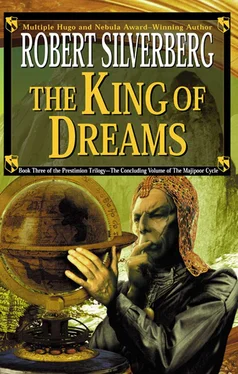“Not necessarily. I’ll remind them of the covenant that binds them in loyalty.”
Prestimion stared. “And if they laugh at you, what course of action will you take?”
“I promised you, Prestimion, that I would do whatever needs to be done to restore the rule of law in Zimroel. I intend to keep that promise.”
“By measures that nevertheless fall short of outright war.”
“I’ve never said that. I’ll have troops with me. I’d use them if I had to. But I don’t think a war will be necessary.”
“If I tell you that I see it as the only solution, that will put us in direct conflict, you and me, won’t it?” Prestimion still spoke in a measured tone, but his anger was rising from moment to moment. This was a development he had never envisioned. In all the years since Dekkeret had first emerged as the obvious choice to become the next Coronal, Prestimion not once had imagined that he and Dekkeret would ever find themselves differing on any great matter of state. This seemed the final betrayal, to have his own protégé rise up against him in a time of such crisis. “I urge you, Dekkeret, rethink what you’ve just said.”
“You are Pontifex, majesty. I obey you in all things and always will. But I tell you, Prestimion, I oppose this war of yours with all my soul.”
“Ah,” said Prestimion. “With all your soul.”
Prestimion had not felt so baffled since the moment long ago when he had watched Confalume’s son Korsibar placing the starburst crown on his own head with his own hands and proclaiming himself king. What is the Pontifex to do, he asked himself, when his Coronal throws his orders back in his face? Confalume had never prepared him for something like this. Prestimion saw the relationship between himself as Pontifex and Dekkeret as Coronal, suddenly, much as the aging and increasingly ineffectual Confalume, grudgingly yielding power to the young firebrand Coronal Lord Prestimion, must once have seen it in his own day.
He fought to contain his surging temper. In another moment he would be shouting and snarling. That must not be allowed to happen. To win time for himself he broke a stajja-cake in half, nibbled at it without interest, washed it down with cool golden wine.
“Very well,” Prestimion said at last. “You think you can avoid war. No doubt you can, if you’re resolved not to start one. But that still leaves the problem of Mandralisca and his uprising. You’ve pledged to bring both of them under control. Just how do you plan to do that if not by military force?”
“The same way we did in the campaign against the Procurator. Mandralisca has a helmet. We have helmets also. He has a Barjazid: I have a Barjazid. My Barjazid will outmaneuver his Barjazid and take him out of the picture; and that will leave Mandralisca at my mercy.”
“I think this is naive of you, Dekkeret.”
Now anger flared for an instant in the younger man’s eyes. “And I think your thirst for war against your own citizens is an unbecoming thing for one who fancies himself a great monarch, Prestimion. Especially when it’s a war you’ll be waging by proxy, many thousands of miles from the battlefield.”
It was difficult for Prestimion to believe that Dekkeret had actually said such a thing. “No!” he roared, slamming his open hand against the table so that the cutlery jumped high and the wine-flask went flying over the edge. “Unfair! Unfair! Wrongheaded and unfair!”
“Prestimion—”
“Let me speak, Dekkeret. This must be answered.” Prestimion realized that his hands were clenched into fists. He put them out of sight. “I have no thirst for war,” he said, as calmly as he could manage it. “You know that. But in this case I think war is unavoidable. And I will wage it myself, Dekkeret, if you have no stomach for it. Do you think I’ve forgotten how to fight? Oh, no, no: you get yourself back to the Castle, my lord, and I will take the troops to Zimroel, and I’ll take my place proudly in the front lines with Gialaurys and Septach Melayn, as we did in the old days.” His voice was rising again. “Who was it who broke Korsibar’s armies that day at Thegomar Edge, when you were not much more than a boy? Who was it who put the thought-helmet on his own head in this very building and reached out to smash Venghenar Barjazid with it in the Stoienzar jungles? Who was it who—”
Dekkeret raised both his hands in appeal. “Gently, your majesty. Gently. If there is to be another war, and may the Divine spare us from that, you know I will lead it, and I will win it. But let this rest a moment, I pray you. There’s more to tell you, and it has implications that reach far beyond the problems of the moment.”
“Speak, then,” Prestimion said in a hollow voice. His furious outburst had left him numb. He wished he had not knocked the wine over, now.
Dekkeret said, “Do you remember, Prestimion, when we spoke in the tasting-room at Muldemar House, just the two of us as we are this morning, and you reminded me of that strange prophecy of Maundigand-Klimd’s that a Barjazid would become the fourth Power of the Realm? Neither of us could make any sense of that then, and we put it aside as an impossibility. But in this night just past I understood its meaning. A fourth Power is needed. And with your consent I will create Dinitak Barjazid as that Power, once the matter of Mandralisca and the five Sambailids is behind us.”
“I see that you have gone mad,” said Prestimion, all rancor gone, only sadness in his tone now.
“Hear me out, I pray. Judge my madness for yourself when I’ve spoken.”
Prestimion’s only response was a resigned shrug.
“We have never known such prosperity on Majipoor as we have in the modern era,” said Dekkeret. “The era of Prankipin and Lord Confalume—of Confalume and Lord Prestimion—of Prestimion and Lord Dekkeret, if you will. But we have never known such turbulence, either. The coming of the mages and sorcerers, the rise of the strange new cults, the troublemaking of Dantirya Sambail and Mandralisca—all these things are new to us. Perhaps the one thing goes with the other, prosperity and turbulence, the uncertainties of new wealth and the mysteries of magic. Or perhaps we have simply grown too populous, now—with fifteen billion people on one world, huge though it is, perhaps there must inevitably be some discord, even strife.”
Prestimion sat quietly, waiting to see where this was going. It was evident that Dekkeret had rehearsed this speech over and over in his mind for half the night: it behooved him, especially after his angry outburst of a few moments before, to give it some show of attention before rejecting whatever demented irrational idea it was that his chosen Coronal had managed to spawn.
Dekkeret went on: “In the earlier time of troubles that we speak of as the time of Dvorn, the first two Powers were created, with joint command: the Pontifex the older, wiser monarch to whom the responsibility for devising policy was given, and the Coronal the younger, more vigorous man who had the task of executing those policies. Later, when a wonderful new invention made it possible, came the third Power, the Lady of the Isle, who with her multitude of associates enters the minds of great numbers of people each night and offers them solace and guidance and healing. But the equipment the Lady uses has its limitations. She can speak with minds, but she is unable to direct or control them. Whereas these helmets that the Bar-jazids have invented—”
“Have stolen, rather. A sniveling treacherous little Vroon named Thalnap Zelifor invented the things. One of the many errors for which I will be someday called to account is that I put that Vroon and his helmets into the hands of Venghenar Barjazid, to our great injury ever since.”
Читать дальше












